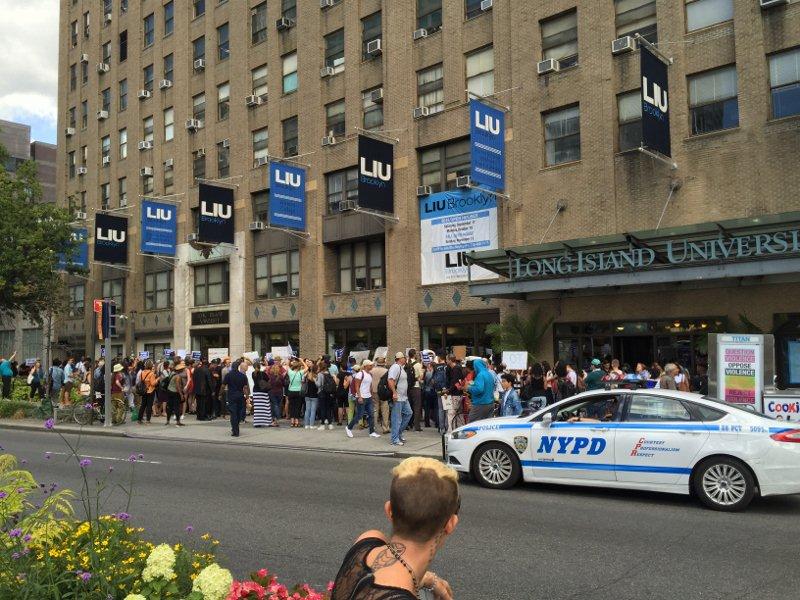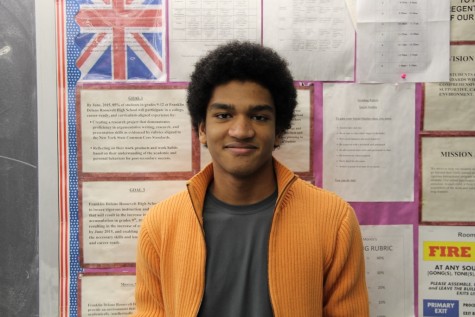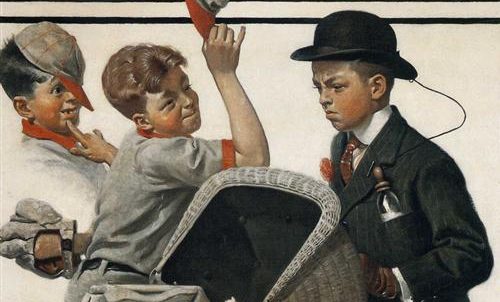#LIUlockout And The Students That Were There
It was the worst first day of college anyone could imagine.
At the Long Island University Brooklyn campus, Wednesday, September 7, students came to their first day classes. Their teachers were gone, locked out from the school. The teachers at LIU were instead janitors, deans and teachers unprepared to teach the courses they were assigned to.
The original teachers were locked out because the teacher’s union, the LIU Faculty Federation, and the LIU administration were fighting over a new payment contract. LIU administration decided to lock out the teachers, even though the teachers weren’t on strike. In the fight between faculty and administration, students were caught in the middle.
From interviewed students and social posts, students coped with the lock out in their own ways, from protests to petitions. Here are two perspectives I was able to find.
Tim Hardin, retired Army service member, was a junior at LIU Brooklyn studying journalism. As he saw professors get locked out, he took to social media in support of them. He cancelled all of his classes at LIU Brooklyn in protest.
That’s $18,128 I just took out of LIU’s faculty-oppressing and student-undermining pockets #LIUlockout #LIUWalkout pic.twitter.com/SMQAtkTb8V
— Overton Window liker (@TimTakesTime) September 9, 2016
The funding for the Yellow Ribbon program was capped, which meant Hardin had to pay more out of pocket.
Hardin shared an email. It was sent by Dr. Kimberly R. Cline, president of LIU Brooklyn, to students.
Hardin said the email was “full of misinformation,” and that it was “….posturing….empty rhetoric” that was sent to try to convince students the strike made by the professors was a yearly occurrence.
Other students like Hardin have protested on social media:
While some have called for protest:
Change doesn’t come by sitting silently while others determine your fate. Students stand up & fight! #liulockout https://t.co/KE07IK46ko
— Kathyria Arevalo (@Kathyria4) September 10, 2016
Others took to the streets to protest:
@NYCMayorsOffice @nytimes @LIUBrooklyn @LIUPost @nyc311 @BOENYC @NYCEducation_ #LIULOCKOUT pic.twitter.com/ZA8RXj3NSP
— Sheiri Mekhaiel (@SheiriM) September 10, 2016
Carmine Lacertosa, first year grad student, attended LIU Brooklyn while the lockout began. He recalled his first two days on campus.
The first day of class, Wednesday, September 7, Lacertosa said he had a “replacement professor qualified in the field but grossly unprepared for the class. She admittedly was not prepared or had any intentions of teaching the course; she dismissed us 30 minutes into our near-three hour course.”
The next day, Lacertosa said he, “saw no professor show up to our course. Most students were already turned off and frustrated by the lack of professionalism. We waited for 45 minutes but no professor ever turned up to teach the course.”
After the 45 minute waited, Lacertosa’s class walked outside in protest.
Lacertosa said, “As a grad student, we do not know what to do, you just can’t sign up for grad school; if we drop classes then we lose a year of our education & our life; we’d need to reapply!”
Other students have their stories, and their knowledge of what happened. As the LIU Faculty Federation and the LIU administration debated on a new contract, more students had to make tough choices. Students like Carmine Lacertosa and Tim Hardin, had to decide whether it’s worth staying at LIU Brooklyn, or going somewhere else.
Monday, September 12, was decision day for the LIUFF and the LIU administration on whether to agree, or disagree on a contract. They agreed, but the damage was done to students.
From the two students I talked to, they both shared a similar idea: they felt cheated.
Lacertosa said, “I can’t help but wonder what rights & legalities are being broken throughout this process. Inadequate individuals attempting to teach grad courses which cost an exorbitant amount of money; that must be illegal somehow!”
In a Tweet, Hardin said, “I didn’t spend 3 years in Iraq and Afghanistan just so LIU could saddle me with student debt and substandard education.” Others shared a similar belief.
All of my replacement prof are not even qualified to teach and some didnt even show up to class, what a way to scam the students #LIUlockout
— NΛSEEM (@NaseemSaleh) September 8, 2016
The sub had the nerve to tell us to buy the textbook. I ain’t paying a dime till we get our professors back. #LIUlockout
— Sharda Mohammed (@S_MohammedX) September 7, 2016
Joined @LIU_FF calling out @LIUBrooklyn President Cline for cutting off opportunities for our students #LIUlockout pic.twitter.com/GUnwAiINyV
— Randi Weingarten (@rweingarten) September 9, 2016
A list of sources and information has been produced by S. E. Hackney, a Phd student, about the hashtag #LIUlockout for those who want to know more.
*Correction* An earlier version of this article incorrectly stated Tim Hardin as a retired Army Special Forces member. Hardin was a former member of Psychological Operations in the U.S. Army.












